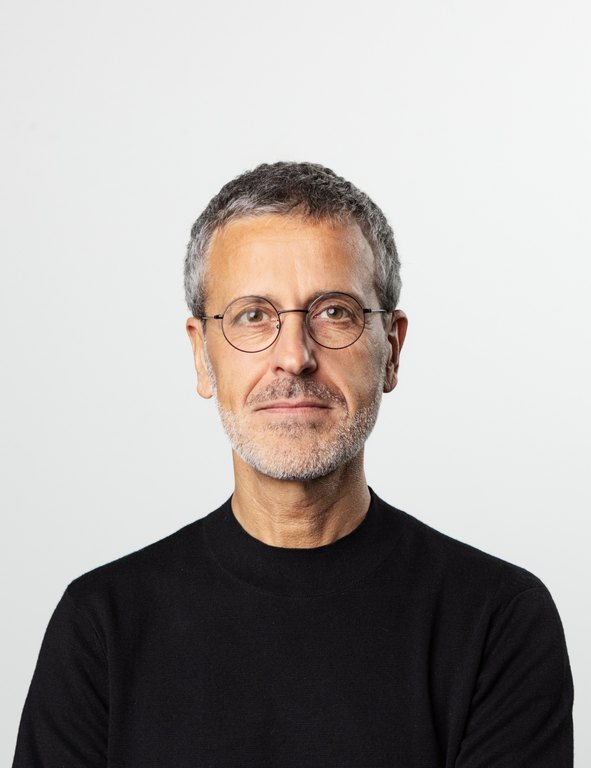Adjunct professor Alex Arteaga: Changing the world for the better is an essential goal of artistic research
University researcher Alex Arteaga studies the ‘common self,’ a variety of togetherness that enables collective and transformative experiences of the surroundings and can lead to social change. Arteaga is the first to be awarded the adjunct professorship at the University of the Arts Helsinki’s research institute, established in 2023.

In many ways, Alex Arteaga is a fitting choice as the first adjunct professor at the Uniarts Helsinki’s research institute promoting interdisciplinarity and cross-artistic research.
The dual citizen of Spain and Germany has studied music theory, piano, electronic music, composition, and architecture in both Barcelona and Berlin, and he holds a PhD in philosophy from Humboldt University Berlin. Naturally, Arteaga’s research interests are also transdisciplinary – or as he prefers to call them, non-disciplinary.
“It is great to be the first adjunct professor at the research institute. I believe this is an important step for the Uniarts Helsinki, and I am happy to contribute to that. Uniarts Helsinki is one of the world’s most important institutions for artistic research.”
Arteaga has had ties to Helsinki for a long time.
“I have been visiting Helsinki to meet colleagues working at the academies for about 15 years, especially at the Academy of Fine Arts and the Theatre Academy, and in recent years also at the Sibelius Academy.”
A recent research grant prompted Arteaga to move to Helsinki, and he now works as a university researcher at the Uniarts Helsinki’s research institute.
Participants become researchers
Currently, Arteaga is conducting fundamental artistic research on specific forms of togetherness that allow individuals to develop new and unexpected perspectives. Arteaga uses the term “common self”.
“I am particularly interested in how a common self perceives. To this end I conceive research practices mainly in the aural medium. I do not study the experience of sound itself but rather how environments change when we activate in particular ways our abilities of hearing and listening ”
When we listen together, we can simultaneously experience how the environment appears to us in radically different ways.
A layperson’s thoughts might first go to a concert, where people listen to music together. Could this serve as a practical example of an actively listening common self?
“Most often, concertgoers still experience music as individuals,” Arteaga responds.
Instead, he provides an example from his own research project called “The sense of common self.”
Arteaga will run collective and experimental research frameworks in Rovaniemi in which listening and hearing practices may provide conditions for transformative environmental perception. He has selected one hundred spots in Rovaniemi, where he leads small groups. In these places, the groups perform aural research practices under Arteaga’s guidance.
“When we listen together, we can simultaneously experience how the environment appears to us in radically different ways .”
In the first phase, the collective and experimental research frameworks will be conducted as part of a joint exhibition at the University of Lapland’s galleria Hämärä at the end of January and beginning of February. These groups are open to everyone, but they will likely include students and teachers from the University of Lapland.
Arteaga plans to carry out the second phase in May, also in Rovaniemi. This time, he hopes that participants will come from outside the university.
According to Arteaga, participants become – at least temporarily – researchers who simultaneously transform themselves and the environment they study. He calls this type of research transformative.
“This is also a good alternative to citizen science!”
“Artistic research is fundamental research”
According to Alex Arteaga, all research must aim to change the world. He believes that the idea of art for art’s sake is outdated.
“I do not see justification for research whose ultimate goal is not to change the world for the better. This does not mean that every research project must achieve this directly and explicitly, but social change must be on the horizon of all research.”
Arteaga believes that research must contribute to collective life. This inevitably raises the question of how to change the world.
“Artistic research must identify its ways of changing the world. They cannot be the same as those of other fields. We must find ways to contribute to sustainable and viable living in our own way.”
For Arteaga, aesthetic thinking is a fundamental variety of social and political thinking. Often, aesthetic thinking is overlooked in favor of rather normative and abstract considerations.
“The experience of collective being in the environment is one of the most fundamental frameworks needed to change the world,” Arteaga explains. “When we achieve a transformative common sense of the place we live in, social change can begin.”
Arteaga sees the disappearance of spontaneously arising, open identities as a problem. ” Collective identities are mostly built through discourses and other constructions that respond to private interests rather than to unmediated processes of living together in and with the environments.”
Sensuous experiencing is the most fundamental process we carry out all the time, every day, Arteaga emphasizes. “The core of my work is to connect aesthetic sense-making with social change.”
Arteaga believes he will work on this topic in one way or another for the rest of his career.
“I want to continue researching and developing the significance of aesthetic thinking and aesthetic research in society, also outside the academic world. I believe that such research complements the humanities and natural sciences in an essential way.”
Read more about Arteaga’s project ‘The sense of common self‘
‘The sense of common self’ is a subproject of ‘How to Live Together in Sound? Towards Sonic Democracy‘